初中-英语-牛津译林版-七年级上册-M6U1教案
- 格式:docx
- 大小:294.70 KB
- 文档页数:11
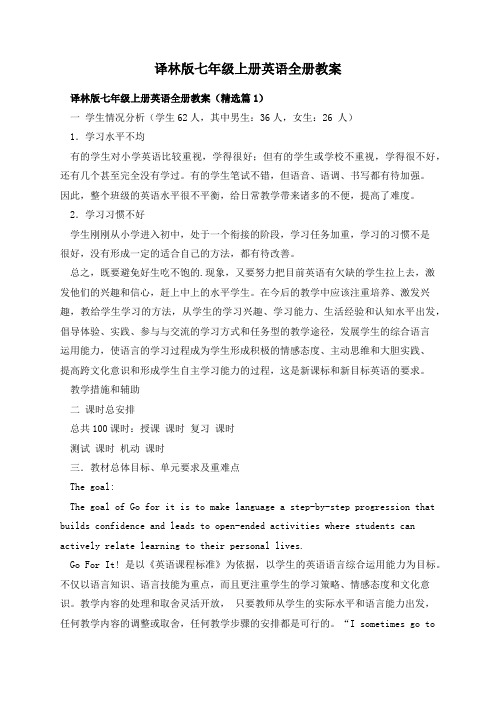
译林版七年级上册英语全册教案译林版七年级上册英语全册教案(精选篇1)一学生情况分析(学生62人,其中男生:36人,女生:26 人)1.学习水平不均有的学生对小学英语比较重视,学得很好;但有的学生或学校不重视,学得很不好,还有几个甚至完全没有学过。
有的学生笔试不错,但语音、语调、书写都有待加强。
因此,整个班级的英语水平很不平衡,给日常教学带来诸多的不便,提高了难度。
2.学习习惯不好学生刚刚从小学进入初中,处于一个衔接的阶段,学习任务加重,学习的习惯不是很好,没有形成一定的适合自己的方法,都有待改善。
总之,既要避免好生吃不饱的.现象,又要努力把目前英语有欠缺的学生拉上去,激发他们的兴趣和信心,赶上中上的水平学生。
在今后的教学中应该注重培养、激发兴趣,教给学生学习的方法,从学生的学习兴趣、学习能力、生活经验和认知水平出发,倡导体验、实践、参与与交流的学习方式和任务型的教学途径,发展学生的综合语言运用能力,使语言的学习过程成为学生形成积极的情感态度、主动思维和大胆实践、提高跨文化意识和形成学生自主学习能力的过程,这是新课标和新目标英语的要求。
教学措施和辅助二课时总安排总共100课时:授课课时复习课时测试课时机动课时三.教材总体目标、单元要求及重难点The goal:The goal of Go for it is to make language a step-by-step progression that builds confidence and leads to open-ended activities where students can actively relate learning to their personal lives.Go For It! 是以《英语课程标准》为依据,以学生的英语语言综合运用能力为目标。
不仅以语言知识、语言技能为重点,而且更注重学生的学习策略、情感态度和文化意识。

译林版七年级上册英语全册教案一、教学内容Unit 1 This is me!Unit 2 Let's play sports!Unit 4 My dayUnit 5 Let's eat!Unit 6 Happy birthday!详细内容包括:自我介绍、兴趣爱好、学校生活、日常生活、饮食文化、生日庆祝等。
二、教学目标1. 掌握基本的英语词汇和常用句型,能够进行简单的自我介绍和日常交流。
2. 能够运用一般现在时描述自己的日常生活和兴趣爱好。
三、教学难点与重点难点:一般现在时的运用、词汇的拓展和运用、日常交流的表达。
重点:自我介绍、兴趣爱好、日常饮食、学校生活等方面的表达。
四、教具与学具准备1. 教具:多媒体设备、黑板、卡片、挂图等。
2. 学具:英语课本、练习册、笔记本、字典等。
五、教学过程1. 导入:通过歌曲、故事或实践情景引入,激发学生的学习兴趣。
2. 新课内容展示:展示新课的词汇、句型和语法,结合实践情景进行讲解。
3. 例题讲解:通过典型例题,引导学生理解和运用所学知识。
4. 随堂练习:设计相关的练习题,让学生在课堂上进行巩固。
5. 小组活动:分组讨论、角色扮演等形式,培养学生的合作精神和口语表达能力。
六、板书设计1. 本节课的主题和重点词汇。
2. 重点句型和语法。
3. 例题和答案。
七、作业设计1. 作业题目:(1)编写一段自我介绍,包括姓名、年龄、兴趣爱好等。
(2)运用一般现在时,描述你的日常生活。
(3)根据所学内容,设计一份健康饮食菜单。
答案示例:(1)Hello, my name is Li Hua. I'm 12 years old. I like playing basketball and listening to music.(2)I usually get up at 6:30 a.m. I have breakfast at 7:00 a.m. Then I go to school. I have lunch at 12:00 p.m. After school, I play sports with my friends.(3)Healthy Eating Menu:Breakfast: an apple, a glass of milk, a piece of breadLunch: rice, fish, vegetables, soupDinner: noodles, chicken, tomatoes, a glass of juice八、课后反思及拓展延伸2. 拓展延伸:推荐相关的英语学习资源,鼓励学生在课后进行自主学习,提高英语水平。
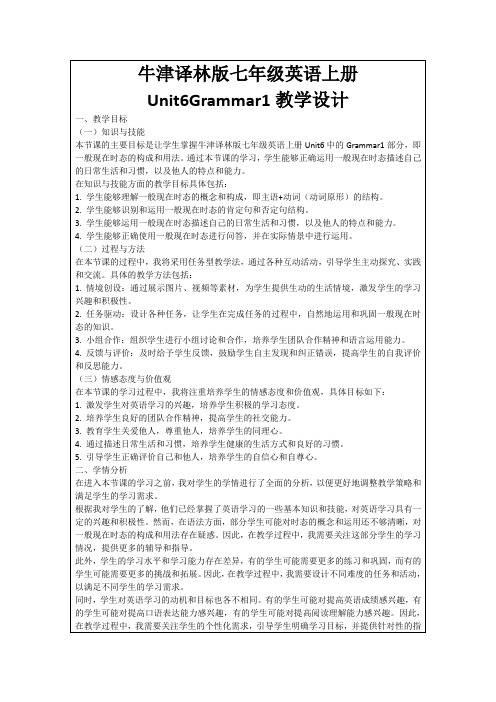
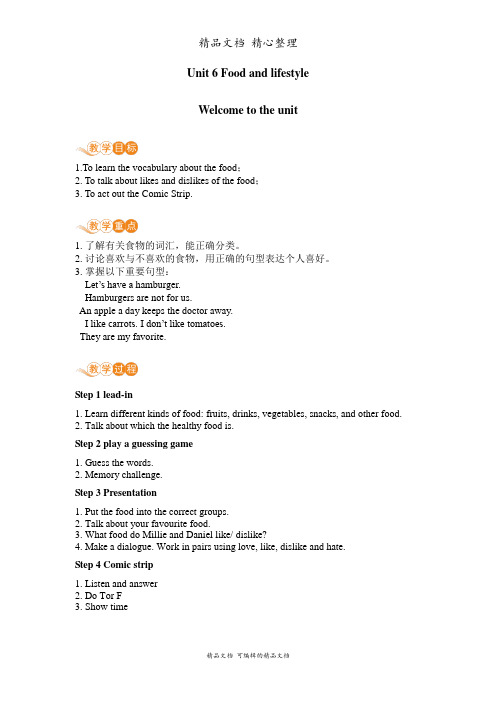
Unit 6 Food and lifestyleWelcome to the unit1.To learn the vocabulary about the food;2. To talk about likes and dislikes of the food;3. To act out the Comic Strip.1. 了解有关食物的词汇,能正确分类。
2. 讨论喜欢与不喜欢的食物,用正确的句型表达个人喜好。
3. 掌握以下重要句型:Let’s have a hamburger.Hamburgers are not for us.An apple a day keeps the doctor away.I like carrots. I don’t like tomatoes.They are my favorite.Step 1 lead-in1. Learn different kinds of food: fruits, drinks, vegetables, snacks, and other food.2. Talk about which the healthy food is.Step 2 play a guessing game1. Guess the words.2. Memory challenge.Step 3 Presentation1. Put the food into the correct groups.2. Talk about your favourite food.3. What food do Millie and Daniel like/ dislike?4. Make a dialogue. Work in pairs using love, like, dislike and hate.Step 4 Comic strip1. Listen and answer2. Do Tor F3. Show time1. Act the dialogue out.2. Make a list of your food you love, like, dislike and hate.3. Do some exercise.。
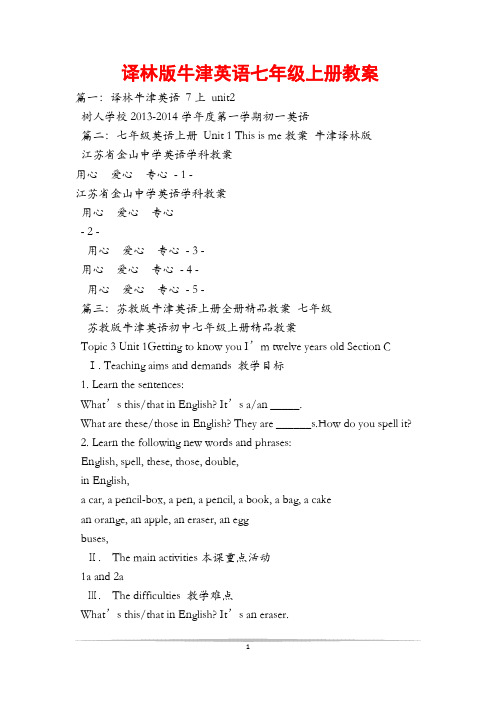
译林版牛津英语七年级上册教案篇一:译林牛津英语7上unit2树人学校2013-2014学年度第一学期初一英语篇二:七年级英语上册Unit 1 This is me教案牛津译林版江苏省金山中学英语学科教案用心爱心专心- 1 -江苏省金山中学英语学科教案用心爱心专心- 2 -用心爱心专心- 3 -用心爱心专心- 4 -用心爱心专心- 5 -篇三:苏教版牛津英语上册全册精品教案七年级苏教版牛津英语初中七年级上册精品教案Topic 3 Unit 1Getting to know you I’m twelve years old Section C Ⅰ. Teaching aims and demands 教学目标1. Learn the sentences:What’s this/that in English? It’s a/an _____.What are these/those in English? They are ______s.How do you spell it?2. Learn the following new words and phrases:English, spell, these, those, double,in English,a car, a pencil-box, a pen, a pencil, a book, a bag, a cakean orange, an apple, an eraser, an eggbuses,Ⅱ. The main acti vities本课重点活动1a and 2aⅢ. The difficulties 教学难点What’s this/that in English? It’s an eraser.What are these/those in English?They are buses.How do you spell it?IV. Teaching aids 教具1. Practicalities: A oranges, apples, eggs, bagsB a pencil-box, a pen, a pencil, an eraser, some books 2.Pictures: a picture of a car, a picture of three buses, a picture of some cakes3. MultimediaV.Teaching methods教学方法Teaching with the practicalitiesTalking and guidingVI. Teaching steps教学步骤Step 1 Preparing(3 minutes)1. T and Ss: Sing the English song “Where’re you from” together.2. T: Perform the English as you like.Ss: 10 pairs to perform1。
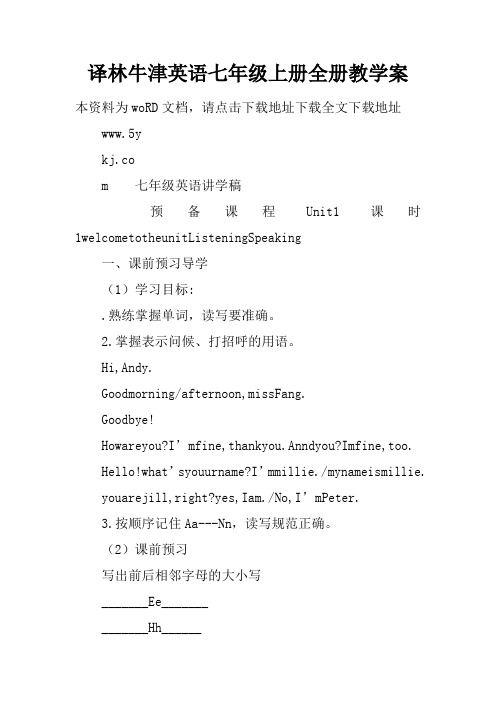
译林牛津英语七年级上册全册教学案本资料为woRD文档,请点击下载地址下载全文下载地址www.5ykj.com 七年级英语讲学稿预备课程Unit1课时1welcometotheunitListeningSpeaking一、课前预习导学(1)学习目标:.熟练掌握单词,读写要准确。
2.掌握表示问候、打招呼的用语。
Hi,Andy.Goodmorning/afternoon,missFang.Goodbye!Howareyou?I’mfine,thankyou.Anndyou?Imfine,too.Hello!what’syouurname?I’mmillie./mynameismillie.youarejill,right?yes,Iam./No,I’mPeter.3.按顺序记住Aa---Nn,读写规范正确。
(2)课前预习写出前后相邻字母的大小写_______Ee______________Hh____________kk____________cc______________mm___________jj______二、课堂合作探究找出与其它字母含有元音音素不同的选项。
()1.A.AaB.Eec.HhD.jj()2.A.BbB.Ddc.EeD.Ff()3.A.kkB.Llc.mmD.Nn()4.A.AaB.DdD.Ee()5.A.IiB.Hhc.jjD.kk三、课内练习巩固A)根据句意及汉语提示,拼写单词。
.Howareyou___________(今天)?2.Ithinkyouranswer(答案)is___________(正确的).3.IlikewatchingTVinthe____________(晚上).4.________(喂),thisismr.Greenspeaking.5.________(什么)canyouseeinthepicture?B)根据句意及首字母提示,补全单词。
6.m_______Greenismr.Green’swife.7.Goodm___________,Simon.Let’sgotoschool.8.—what’syourn_________?—millie.9.G____________,mr.Lu.Seeyoutomorrow.0.—AreyouDaniel?—y______,Iam.四、课后拓展延伸单项选择,选择最佳答案。
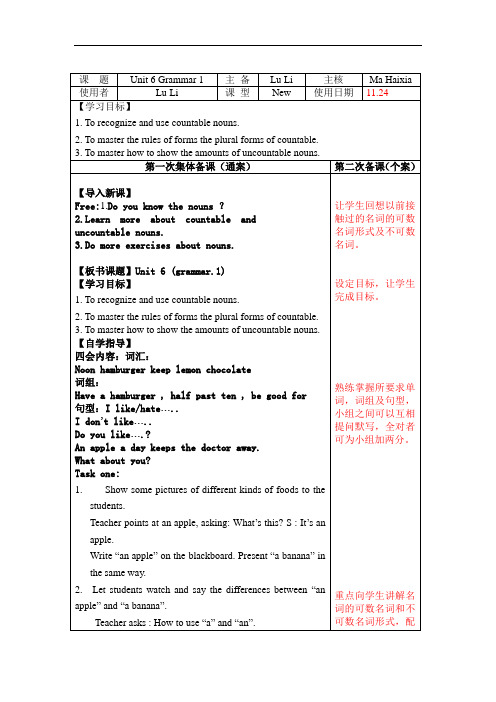
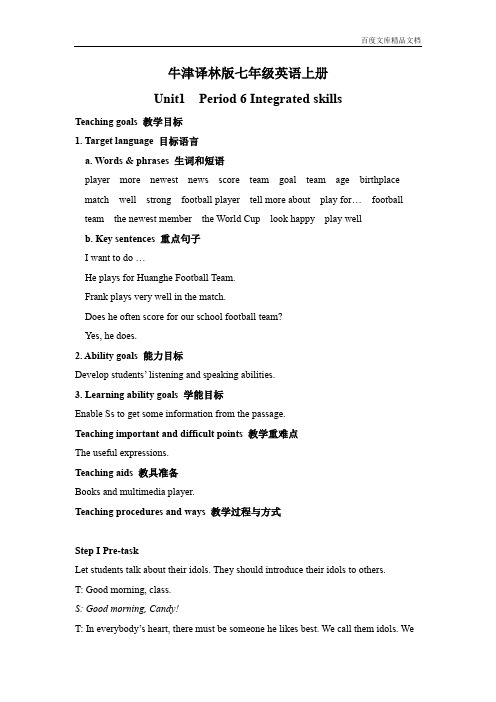
牛津译林版七年级英语上册Unit1 Period 6 Integrated skillsTeaching goals 教学目标1. Target language 目标语言a. Words & phrases 生词和短语player more newest news score team goal team age birthplace match well strong football player tell more about play for… football team the newest member the World Cup look happy play wellb. Key sentences 重点句子I want to do …He plays for Huanghe Football Team.Frank plays very well in the match.Does he often score for our school football team?Yes, he does.2. Ability goals 能力目标Develop students’ listening and speaking abilities.3. Learning ability goals 学能目标Enable Ss to get some information from the passage.Teaching important and difficult points 教学重难点The useful expressions.Teaching aids 教具准备Books and multimedia player.Teaching procedures and ways 教学过程与方式Step I Pre-taskLet students talk about their idols. They should introduce their idols to others.T: Good morning, class.S: Good morning, Candy!T: In everybody’s heart, there must be someone he likes best. We call them idols. Weimitate them and learn from them. For example, my idol is Liu Xiang because he runs very fast and wins honors for China. Then, who is your idol?S1: My idol is Andy Liu.T: Good. Can you introduce him to us? How old is he? Where is he from?S1: He is more then 40 years old but he looks very young. He is in Hong Kong. He has a lot of fans. He sings well and he is a good actor, too.T: Very good. Thank you very much. And I like him very much, too. I can sing a lot of his songs. Anybody else?S2: My idol is Jay Zhou. He is from Taiwan and he is very young. He can sing very beautiful songs. He is the most famous singer now. I love him.T: Great! It’s fun for us to have an idol.Step II While-taskStudents will learn to the tape about a football star. They are supposed to catch the basic information about him. After listening, they are going to talk about their own stars and make a dialogue about that.T: Do you remember our friend, Simon?S: Yes.T: Good. He has an idol, too. Please read the sports news on p16. And please tell me who is his idol and what does he do. Ok? I will give you 1 minute to read it.Ss read.T: Answer my four questions. What is his name?S3: His name is Li Hua.T: Right. What is his job?S4: He is a football player.T: Right. What is his hobby?S5: His hobby is to read books about football.T: Very good. Then what does he do every day?S6: He plays football every day.T: So far so good. Now, let’s learn some new words and phrases.1.sports news: 体育新闻2.football player: 足球运动员3.the newest member: 最新的成员4.score goals: 射门得分5.every day: 每天6.next World Cup: 下一届世界杯7.team: 团队8.look + adj. 看上去…… (提醒学生用形容词)9.age: 年龄10.birthplace: 出生地Write the words and phrases on the blackboard. Let students read after me for several times until they can say them fluently.T: Simon is listening to the radio and he has written an article about Li Hua. Look at the article on p17. You can see the article is not completed. Please listen to the radio again and help Simon to complete it. You can listen to it twice. Now, pay attention. Students listen to the tape and fill in the blanks on p17. They will listen to it twice. This article is not very difficult, so I just ask them to read together and they can check the answers.T: Ok. This is all the radio about Li Hua. Did you catch it?S: Yes.T: I am glad to hear that. Please read together and check the answers.Ss read and check.T: Great! You’ve done a good job. Daniel and Sandy are talking about their favorite football players at school. Open your books to p17. Let’s read it together.Ss read the dialogue.T: Nice voice. Now, talk about your favorite football players. Use Daniel and Sandy’s conservation as a model. Work with your desk mate for three minutes.Ss Pair work.T: Time’s up. Let’s share.Sample 1:A: Hi, Lily. You look great! What makes you so happy?B: Oh, I am going to watch Andy Liu’s concert. He is my favorite singer.A: Who is Andy Liu?B: My god! You don’t know? Ok, his Chinese name is 刘德华.A: Oh, it’s him. I love him, too.B: You can go with me. He sings very well, don’t you think so?A: Yes. But I will ask my mother first. I hope I can go with you.B: If you go, please call me. Bye!A: Bye!Sample 2:A: Hello, Sally! How are you?B: Hello, John. I’m fine. You look good, too.A: Would you like to join my group? It’s about Jacky Chen (成龙)?B: Really? His is my favorite star. I like his movies very much.A: Ok. So you will come, right?B: Yes. What do you know about him?A: He is very kind to the poor and he always raises money for them. He is not very tall but he is really strong. We are going to ask others to help each other like Jacky Chen.B: Good idea. I am in.A: Good.T: Well done. I love your interesting dialogues. Maybe next time, you can introduce more stars.Step III Post-taskT: We’ve talk a lot about friends. We make friends with classmates and stars as well. Friends make our life better. Can you use a word to describe a friend?S1: Kind.S2: Helpful.S3: Beautiful.S4: Clever.…T: Well, I think we need a lot of friends, but only good friends. Your homework is to find out some idioms about friendship. Class is over. Goodbye, class.S: Goodbye!Step IV Homework1.Write down the dialogue.2.Find 10 idioms about friendship.。
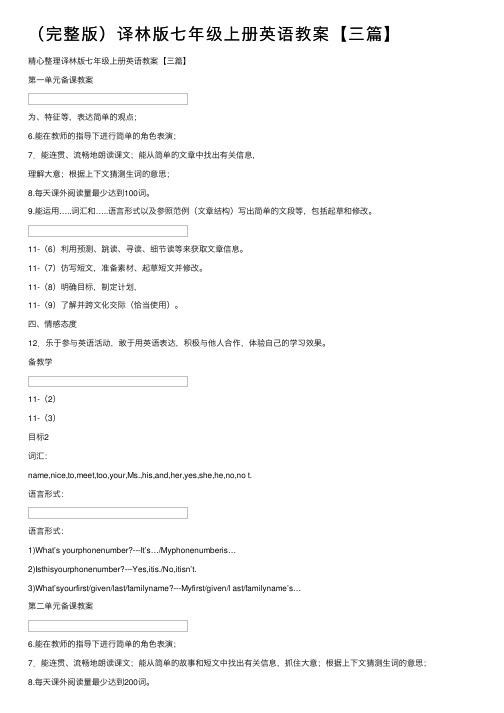
(完整版)译林版七年级上册英语教案【三篇】精⼼整理译林版七年级上册英语教案【三篇】第⼀单元备课教案为、特征等,表达简单的观点;6.能在教师的指导下进⾏简单的⾓⾊表演;7.能连贯、流畅地朗读课⽂;能从简单的⽂章中找出有关信息,理解⼤意;根据上下⽂猜测⽣词的意思;8.每天课外阅读量最少达到100词。
9.能运⽤…..词汇和…..语⾔形式以及参照范例(⽂章结构)写出简单的⽂段等,包括起草和修改。
11-(6)利⽤预测、跳读、寻读、细节读等来获取⽂章信息。
11-(7)仿写短⽂,准备素材、起草短⽂并修改。
11-(8)明确⽬标,制定计划,11-(9)了解并跨⽂化交际(恰当使⽤)。
四、情感态度12.乐于参与英语活动,敢于⽤英语表达,积极与他⼈合作,体验⾃⼰的学习效果。
备教学11-(2)11-(3)⽬标2词汇:name,nice,to,meet,too,your,Ms.,his,and,her,yes,she,he,no,no t.语⾔形式:语⾔形式:1)What’s yourphonenumber?---It’s…/Myphonenumberis…2)Isthisyourphonenumber?---Yes,itis./No,itisn’t.3)What’syourfirst/given/last/familyname?---Myfirst/given/l ast/familyname’s…第⼆单元备课教案6.能在教师的指导下进⾏简单的⾓⾊表演;7.能连贯、流畅地朗读课⽂;能从简单的故事和短⽂中找出有关信息,抓住⼤意;根据上下⽂猜测⽣词的意思;8.每天课外阅读量最少达到200词。
9.能运⽤…..词汇和…..语⾔形式以及参照范例(⽂章结构)写出简单的⽂段等,包括起草和修改。
⼆、⽂化意识10.了解语⾔和语⽤的⽂化因素,体验跨⽂化交际。
11-(8)明确⽬标,制定计划,11-(9)了解并跨⽂化交际(恰当使⽤)。
四、情感态度12.乐于参与英语活动,敢于⽤英语表达,积极与他⼈合作,体验⾃⼰的学习效果。
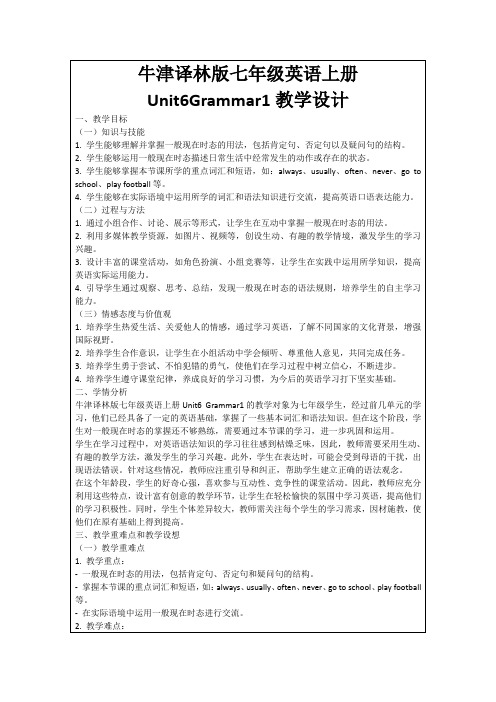
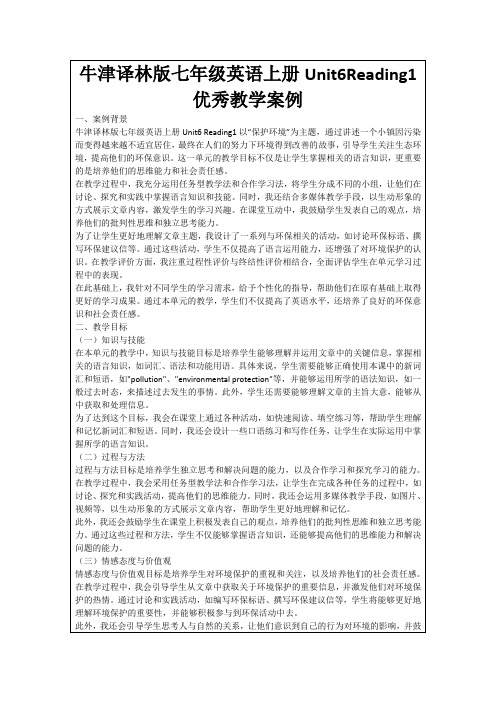
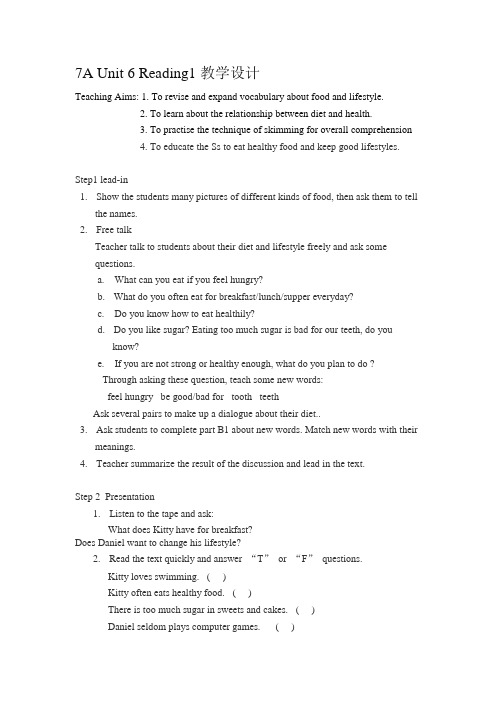
7A Unit 6 Reading1 教学设计Teaching Aims: 1. To revise and expand vocabulary about food and lifestyle.2. To learn about the relationship between diet and health.3. To practise the technique of skimming for overall comprehension4. To educate the Ss to eat healthy food and keep good lifestyles.Step1 lead-in1.Show the students many pictures of different kinds of food, then ask them to tellthe names.2.Free talkTeacher talk to students about their diet and lifestyle freely and ask somequestions.a.What can you eat if you feel hungry?b.What do you often eat for breakfast/lunch/supper everyday?c.Do you know how to eat healthily?d.Do you like sugar? Eating too much sugar is bad for our teeth, do youknow?e.If you are not strong or healthy enough, what do you plan to do ?Through asking these question, teach some new words:feel hungry be good/bad for tooth teethAsk several pairs to make up a dialogue about their diet..3.Ask students to complete part B1 about new words. Match new words with theirmeanings.4.Teacher summarize the result of the discussion and lead in the text.Step 2 Presentation1.Listen to the tape and ask:What does Kitty have for breakfast?Does Daniel want to change his lifestyle?2.Read the text quickly and answer “T”or “F”questions.Kitty loves swimming. ( )Kitty often eats healthy food. ( )There is too much sugar in sweets and cakes. ( )Daniel seldom plays computer games. ( )Daniel does not like to play sports. ( )3.Read Kitty’s article and answer simple questions:How often does Kitty dance?How long dance kitty dance every time?Why is healthy food so important for Kitty?Does Kitty often eat sweet snacks between meals?4. Students read Kitty’s article silently and complete Kitty’s table on part B2.Then say something about Kitty’s diet and lifestyle.5. Deal with Daniel’s article. Read Daniel’s article and answer:What does Daniel like doing?Does he have a healthy lifestyle?What does he plan too eat?What does he plan to do?6.Students read Daniel’s article and complete Daniel’s table on part B2, thenrepeat the passage.Step3 An interviewTeacher say: You are now the reporters of the ‘Get Fit Club’. This week’s topic is to interview your friends about their lifestylesStudents work in pairs and make an interview. Ask more pairs to come to theblackboard if time permits.Step4: Discussion: How to live a healthy life?1.Discuss in groups: How do we eat and live healthily? After discussin ,eachgroup say sth about the question in front of Bb.For example: We should seldom eat sweet snacks.We should often eat fruit and vegetables.We shouldn’t play computer games or watch TV for long.We should exercise for at least 30 minutes every day.We should sleep for more than 8 hours every day.We should smile often and be happy every day!Step 5: WritingWrite a letter to Zhang Huimei to talk about how to keep healthy.Step 6: Further educationEncourage the students to cherish food and refuse to waste.Step 7: Homework1. Read the text carefully and try to retell the text.2. Memorize the new words and expressions in the reading.。
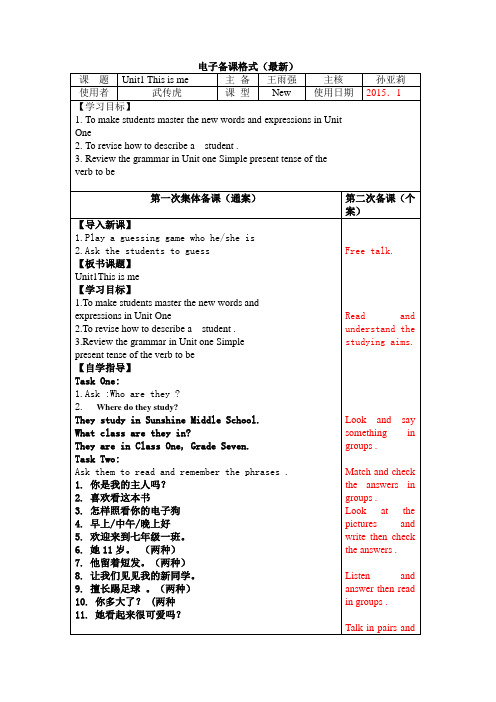
We use ‘am’ when the subject is _____ .We use ‘are’ when the subject is ____ ,____ or _____ .We use ‘is’when the subject is ____ , ____ or _____ .口诀: 我用am, 你用are,is连着他她它,凡是复数都用are.用be动词的适当形式填空:★1. “I” ____ the ninth letter.2. The policemen ____ young.3.The twins _______ at home at weekends.★ 4. Tom with his parents ____ at home.5.Our school __ very big. We __ happy in it.6.You, he and I ____ in the same class.★ 7.Let’s ____ good friends.★ 8.One of his teachers __in his classroom now.9.What ____ four and five? It___ nine.10.How much milk ___ there in the glass?Task 5:1.Finish the exercises by yourself.2.Work in groups to discuss and check the answers.3. Say and understand the exercises.【堂清知识】【当堂检测】一.根据汉语意思或首字母提示完成句子。
1. Kate and I _________ (be) good friends.2. How __________ (be) your grandfather?3. Linda often goes to the______________ (dance) lessons on Saturday.4. ______________ (run) is fun. It is my favourite sport.5. I don’t know how ________________ ( drive) the car.6. My brother often ______________ (have) lunch at school.7. Let’s ___________ (play) football after school.8. Kitty is my good friend. She ________(来自)from England.9. They are all my new _______________(同班同学)10. He likes _______________ (游泳) after dinner.11. ___________[ˈevrɪwʌn] likes Mr. Zhou’s English lessons.12. I am ___________ [ɡlæd] to meet my new friend, Jim.13.–Is that boy Daniel ? --No ,he isn’t . Daniel wears . (眼镜)14.We are in (年级)7.15. Are their ______________(爱好)playing football? Yes, they love itvery much.日清内容一. 单项选择(每小题1分,共15分)( )1. — Do you like playing football?— Yes. I want to be good football player.A. a; aB. a; \C. \; \D. \; a ( )2. —What’s your cousin’s ?— He is 19.A. nameB. ageC. workD. class ( )3. Which girl is Diana? She loves swimming.A. B. C. D.( )4. What grade is Lily ?A. onB. inC. atD. after ( )5. Jack’s is playing computer games.A. hobbyB. gradeC. glassesD. looks ( )6. —all the students at school today?— No. Jim at home.A. Is; isB. Are; areC. Is; areD. Are; is ( )7. I live my parents Yancheng.A. with; inB. in; withC. in; inD. with; with ( )8. — Are you and Tom new students?— Yes. new here.A. You’reB. He’sC. We’reD. They’re ( )9. This is a good book. I love it very much.A. readingB. lookingC. writingD. doing ( )10. —Lucy from the USA?— No, she from the USA. She comes from the UK.A. Does; doesn’tB. Does; isn’tC. Is; doesn’tD. Is; isn’t。
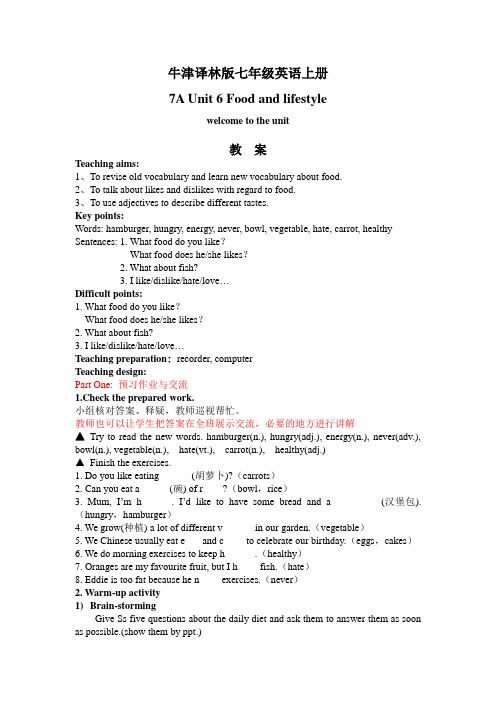
牛津译林版七年级英语上册7A Unit 6 Food and lifestylewelcome to the unit教案Teaching aims:1、To revise old vocabulary and learn new vocabulary about food.2、To talk about likes and dislikes with regard to food.3、To use adjectives to describe different tastes.Key points:Words: hamburger, hungry, energy, never, bowl, vegetable, hate, carrot, healthy Sentences: 1. What food do you like?What food does he/she likes?2. What about fish?3. I like/dislike/hate/love…Difficult points:1. What food do you like?What food does he/she likes?2. What about fish?3. I like/dislike/hate/love…Teaching preparation: recorder, computerTeaching design:Part One: 预习作业与交流1.Check the prepared work.小组核对答案、释疑,教师巡视帮忙。
教师也可以让学生把答案在全班展示交流,必要的地方进行讲解▲Try to read the new words. hamburger(n.), hungry(adj.), energy(n.), never(adv.), bowl(n.), vegetable(n.), hate(vt.), carrot(n.), healthy(adj.)▲Finish the exercises.1. Do you like eating______ (胡萝卜)?(carrots)2. Can you eat a _____ (碗) of r____?(bowl,rice)3. Mum, I’m h______. I’d like to have some bread and a ________ (汉堡包).(hungry,hamburger)4. We grow(种植) a lot of different v______ in our garden.(vegetable)5. We Chinese usually eat e___ and c____ to celebrate our birthday.(eggs,cakes)6. We do morning exercises to keep h______.(healthy)7. Oranges are my favourite fruit, but I h____ fish.(hate)8. Eddie is too fat because he n____ exercises.(never)2. Warm-up activity1)Brain-stormingGive Ss five questions about the daily diet and ask them to answer them as soon as possible.(show them by ppt.)1. How many meals do you have a day?2. What drink do you like best?3. What fruit do you like best?4. What is your favourtie meat?5. What is your favourtie vegetable?交际法,师生问答, 复习已经学过的有关食物的单词。
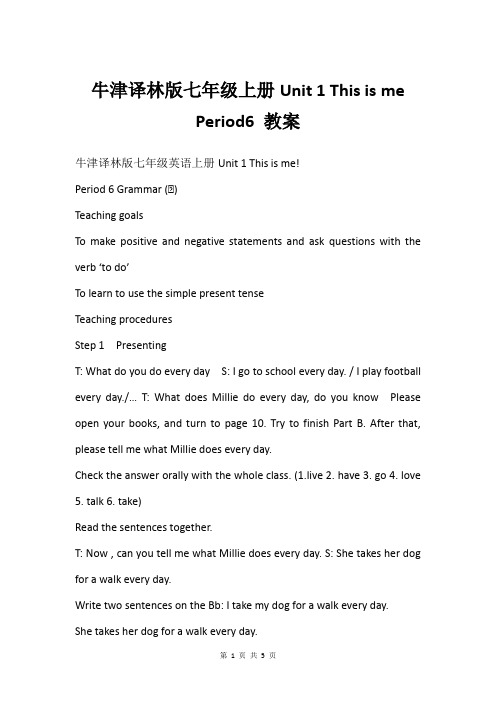
牛津译林版七年级上册Unit 1 This is mePeriod6 教案牛津译林版七年级英语上册Unit 1 This is me!Period 6 Grammar (Ⅱ)Teaching goalsTo make positive and negative statements and ask questions with the verb ‘to do’To learn to use the simple present tenseTeaching proceduresStep 1 PresentingT: What do you do every day S: I go to school every day. / I play football every day./… T: What does Millie do every day, do you know Please open your books, and turn to page 10. Try to finish Part B. After that, please tell me what Millie does every day.Check the answer orally with the whole class. (1.live 2. have 3. go 4. love 5. talk 6. take)Read the sentences together.T: Now , can you tell me what Millie does every day. S: She takes her dog for a walk every day.Write two sentences on the Bb: I take my dog for a walk every day.She takes her dog for a walk every day.Ask: What’s the difference between the two sentences ( We must use verb form for the simple present tense in the third person singular.) But how to change the verb form. Let’s go through the table on page 10. Step 2 PracticingComplete the sentences. Use the simple present tense of the verbs in brackets1. My father_______(listen) to the radio every day.2. He often _______(wash) clothes with his hands.3. We______(take) Eddie for a walk after supper.4. Mike_______ (study) in a middle school.5. Simon ______ (pass) the ball to Daniel.6. Miss Li_______ (teach) us Chinese.7. Look at the animal, it ____ (have) four legs.8. Uncle Wang (fix 修理) bikes for people every day.9. He (stay) at home every Sunday.10.The boy with his parents (go) to the park after supper. (1. listens 2. washes 3. take 4. studies 5. passes 6. teaches 7. has 8. fixes 9. stays 10. goes)Step 3 PresentingT: Do you watch TV every day S: Yes, I do./ No, I don’t. (Ask students to say a complete sentence: Yes, I watch TV every day./ No, I don’t watch TV every day.) (To another student) Does he watch TV every day S: Yes, hedoes. He watches TV every day./ No, he doesn’t. He doesn’t watch TV every day.Step 4 Doing activitiesGo through the tables on page 9. Read them together.Ask Ss to finish Part C and Part D. Check the answer with the whole class. (Part C: 1. Do, Yes, they do. 2. Does, No, he doesn’t. 3. Does, No, she doesn’t 4. Do, No, they don’t. 5. Does, Yes, he does. 6. Do, Yes, they do.)(Part D: 1.do not /don’t play 2. plays 3. does not/ doesn’t walk 4. takes 5. do not/don’t like)Make a conversation:First, ask Ss to think of some verb phrase: play football/ basketball/ computer games…/listen to music/ watch TV/ take my dog for a walk…Conversation 1: A: Do you listen to music every dayB: No, I don’t. I don’t listen to music every day.A: Do you watch TV every dayB: Yes, I do. I watch TV every day.B: Do you play football every dayA: No, I don’t. I don’t play football every day.B: Do you read English every dayB: Yes, I do. I read English every day(Ask Ss to answer with a complete sentence.)Conversation 2: A: I watch TV every day. I don’t listen to music every day. B: Does XXX listen to music every dayC: No, he/she doesn’t. He/She doesn’t listen to music every day.C: Does XXX watch TV every dayB: Yes, he/she does. He/She watches TV every day.4.Ask Ss to finish Part E. Then check the answer with the whole class: ( 1. go 2. play 3. does not/ doesn’t watch 4. watches5. am6. Are7. flies8. have9. eat)Step 5 Taking a summaryWork out the rule of the simple present tense. ( the usage of ‘do/ does’) Step 6 Doing consolidation exercisesComplete the sentences. Use the simple present tense of the verbs in brackets.1. Jordan _______(play) basketball.He ___________(not play) football.2. I _______(go) swimming on Sunday.But I___________ (not go) shopping.3. My cousins _______(enjoy) computer games.But they __________(not enjoy) ball games.4. you _______(like) fishYes, I . But he ___________(not like) fish.5. Kate (walk) homeNo, she . She (take) a bus.6. your mother (teach) EnglishYes, she . She (teach) English in N0.10 Middle School.( 1. plays, doesn’t play 2. go, don’t go 3. enjoy, don’t enjoy 4. Do, like, do, doesn’t like 5. Does, walk, doesn’t, takes 6. Does, teach, does, teaches)Step 7 Doing homeworkRevise the simple present tense.Do some more consolidation exercises.。

译林版七年级上册英语全册教案(最新版)编制人:__________________审核人:__________________审批人:__________________编制单位:__________________编制时间:____年____月____日序言下载提示:该文档是本店铺精心编制而成的,希望大家下载后,能够帮助大家解决实际问题。
文档下载后可定制修改,请根据实际需要进行调整和使用,谢谢!并且,本店铺为大家提供各种类型的教育资料,如幼儿教案、小学教案、初中教案、高中教案、教案模板、教学设计、说课稿等等,想了解不同教育资料格式和写法,敬请关注!Download tips: This document is carefully compiled by this editor.I hope that after you download it, it can help you solve practical problems. The document can be customized and modified after downloading, please adjust and use it according to actual needs, thank you!In addition, this shop provides you with various types of educational materials, such as preschool lesson plans, elementary school lesson plans, junior high school lesson plans, high school lesson plans, lesson plan templates, teaching design, lecture drafts, etc. If you want to learn about different educational material formats and writing methods, please pay attention!正文内容社会生活的信息化和经济的全球化,使英语的重要性日益突出。
Module 6 A trip to the zoo一、学习目标:1. 重点单词:bear, elephant, giraffe, lion, monkey, panda, tiger, zebra, zoo, guide, animal, such, as, come, different, country, other, dangerous, ugh, also, plant, look, tall, leaf (pl. leaves), sure, bamboo, cute, shall, them, which, over, funny, call, Africa, Asia, Europe, little, only, about, kilo (= kilogram ), people, African, grass, large, usually, alone, strong, catch, even2. 重点短语:such as, come from, look at, over there, a little, all over the world, as well as,be good at, many kinds of3.重点句子:1.—That’s a giraffe.— Yes, and there are some giraffes2.—Do lions eat meat?—Yes, they do.3.—Does it eat meat?—No, it doesn’t. It eats plants.4.—Do pandas eat plants and leaves?—Sure. They love bamboo.5. Shall we go and…?6. That’s very funny.7. It doesn’t eat meat.8. The tiger lives in Asia.二、重点及难点:Present simple questions.三、教学设计:Unit 1 Does it eat meat?ⅠTeaching modelListening and speakingⅡTeaching methodInteractive approachⅢTeaching aims1. To find specific information in the listening.2. To recognize the third person singular endings –s.3. To ask and answer questions about animals.4. To enable students to talk about animals.ⅣTeaching ObjectivesKey vocabulary: bear, elephant, giraffe, lion, monkey, panda, tiger, zebra, zoo, guide, animal, such, as, come, different, country, other, dangerous, ugh, also, plant, look, tall, leaf (pl.leaves), sure, bamboo, cute, shall, them, which, over, funny, call Key structures:1.—That’s a giraffe. — Yes, and there are some giraffes2.—Do lions eat meat? —Yes, they do.3.—Does it eat meat? —No, it doesn’t. It eats plants.4.—Do pandas eat plants and leaves? —Sure. They love bamboo.5. Shall we go and…?6. That’s very funny.ⅤTeaching aidsTape recorder , OHP , video , a clockⅥTeaching StepsStep 1 Warming-up1. Lead inT: Hello, boys and girls!Ss: Hello, Mr. Zhang.T: Today, we are going to learn Module 6 A trip to the zoo. Have you been to the zoo?Ss: Yes.T: Do you know Beijing zoo?S1: Yes, I went there last year. I saw many animals…S2:…T: OK. Today I’ll take you to visit Beijing zoo. Are you happy?Ss: Yes.T: Please look at the screen and get to know some information about Beijing Zoo.Ss: …(Look at the screen and try to know some information about it.) 2. Show some pictures to ask and answer: What can you see?Beijing ZooGuide Map of Beijing Zoo3. Call back the answer from the whole class and check the answer. Step 2 Practice1. Show some pictures of the animals.2. Introduce the new words.3. Look at the pictures. Ask and answer: What can you see?bear n. 熊elephant n. 大象giraffe n. 长颈鹿lion n. 狮子monkey n. 猴子panda n. 熊猫zebra n. 斑马tiger n. 老虎plant n. 植物animal n. 动物leaf—leaves n. 叶子bamboo n. 竹子4. Call back the answers from the whole class and check the answer .5. Read the words.Step 3 Work in pairs1. Look at the picture. What can you see?bear elephant giraffe lion monkey pandatiger zebra zoo2. Listen and check ( √) the words in Activity 1 you hear.bear elephant giraffe lion monkey panda tiger zebra zooKeys: giraffe, monkey, panda, zoo3. Now work in pairs and say what you can see.—That’s a giraffe.—Yes, and there are some giraffesStep 4 Listen and read.1. Ask the students to read the conversation silently.2. Play the recording and ask the students to listen and read the conversation.3. Read the conversation.4. Act it out.5. Ask the students to complete the table in Activity 3.6. Call back the answer from the whole class and check the answer. Keys: 1. meat 2. meat, plants 3. plants 4. bambooStep 5 Underline the correct words.1. Ask the students to read through the passage.There are (1) other / many animals from different (2 ) country / countries in Beijing Zoo, (3) such / which as bears, giraffes and pandas. The lions are (4) funny / dangerous because they eat meat. The bears eat meat too, but also (5) plants / leaves. Elephants are (6) different / cute. They’re (7) tall / whi te and eat (8) plants/ meat. Pandas are black and white and eat (9) bamboo / other animals. The (10) panda’s/ guide’s name is Lingling.2. Underline the correct words.3. Call back the answer from the whole class and check the answer. Keys: 1. many 2. countries 3. such4. dangerous5. plants6. different7. tall8. plants9. bamboo 10. panda’sStep 6 Language points1. The zoo has many kinds of animals, such as bears, zebras, giraffes and pandas.such adj. 这样的;如此的可修饰名词,修饰可数名词单数时要置于a / an 之前。
e.g. I don’t like such books. 我不喜欢这样的书。